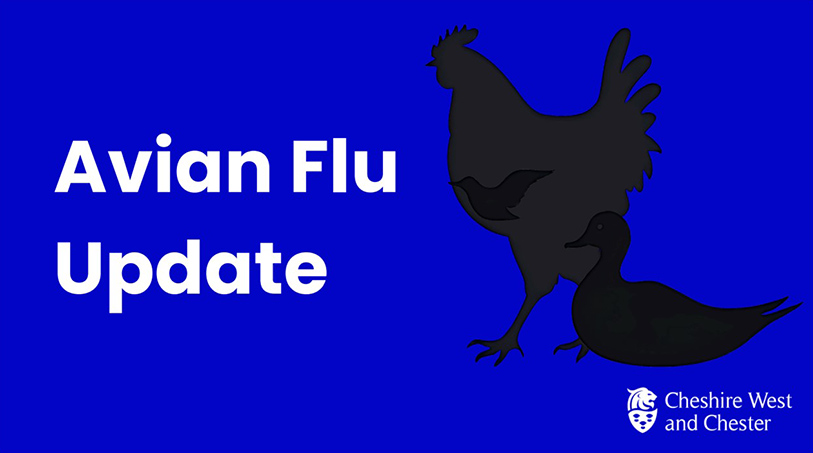Restrictions brought in following bird ‘flu outbreak near Malpas

Cheshire West and Chester Council’s animal health team is advising bird keepers in some areas of the borough of new restrictions concerning the control of avian influenza (bird ‘flu).
On Wednesday 26 February, an outbreak of bird ‘flu was confirmed in commercial poultry at premises near Malpas, Cheshire West and Chester. A 3km protection zone and 10km surveillance zone were declared around the premises, and all poultry on the premises were required to be humanely culled.
The Council’s Cabinet Member for Community Safety and Neighbourhood Pride, Councillor Stuart Bingham said:
In Cheshire West, the 3km protection zone affects only the Malpas ward but also extends into our neighbouring authorities of Shropshire, Cheshire East and Wrexham. The wider 10km surveillance zone takes in part of the Farndon and Tattenhall wards. These zones have been established to stop the movement of birds and prevent the spread of the infection and do not restrict the movement of people and are in addition to the current mandatory housing measures which apply across Cheshire.
Owners of captive birds are asked to check the Animal & Plant Health Agency (APHA) Interactive Avian Influenza Disease Map to see if their premises are in the restricted control zones.
In a disease control zone, you must follow the rules applicable to the zone. Definitive requirements are set out in the published declarations for the disease control zone in force.
By law, if you or your vet suspects that kept birds are showing any signs of disease it must be immediately reported to APHA on: 03000 200 301.
The risk to human health remains very low.
Cllr Bingham added:
All bird keepers are encouraged to maintain high standards of biosecurity as good practice for the health of their birds. Good biosecurity is an essential defence against diseases such as avian influenza and is key to limiting the spread of the disease in an outbreak.
Avian influenza of different types circulates in wild bird populations. It is not always possible to tell that birds are infected as they may not show obvious signs of illness. If possible, do not touch or handle wild birds or their droppings.
If you find a dead wild bird, report it to DEFRA - Report dead wild birds - GOV.UK / 03459 33 55 77.
The Animal and Plant Health Agency (APHA) may collect some dead birds for surveillance testing.
Otherwise, birds can be disposed of in your household waste, but the following steps are advised:
- pick it up wearing disposable gloves or a plastic bag over your hand
- put the bird in a plastic bag and tie it - make sure the bird does not touch the outside of the bag
- put the bag containing the bird in a second (preferably leak proof) plastic bag, along with the gloves or plastic bag you used to pick it up and tie it - take care not to touch the outside of the gloves with bare hands
- put the tied bag in your outside household or municipal waste bin
- wash your hands thoroughly with soap and water
Keepers are reminded that the compulsory registration of poultry and captive birds with APHA has been required since 1 October 2024 regardless of how many birds are kept. If you keep poultry or captive birds that are not kept entirely in your home and have not registered, you must do so now: Register as a keeper of less than 50 poultry or other captive birds - GOV.UK
Further information is available on the Gov.uk website - https://www.gov.uk/guidance/bird-flu-avian-influenza-how-to-prevent-it-and-stop-it-spreading
Online updates will be available here: Information on the latest avian influenza situation and Government guidance.


